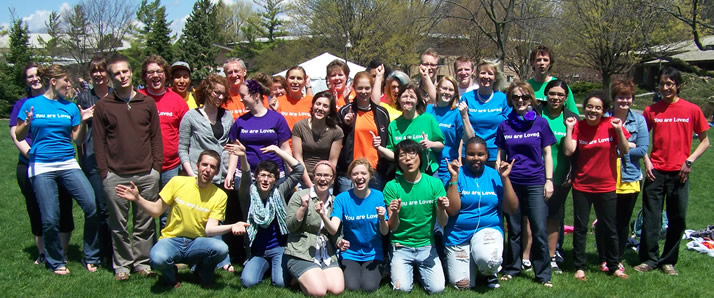The latest from the Princeton Review’s annual college guide “The Best 377 Colleges” ranks Calvin as eighth in the “LGBT Unfriendly” rankings. It rose from last year’s position of 11th.
However, many have questioned the credibility of the methodology of the Princeton Review, including the leadership team on Calvin student organization Sexuality and Gender Awareness (SAGA).
“While the methodology behind the Princeton Review’s rankings remains questionable, one fact is clear: Calvin has come a long way and has a long way to go,” read a statement from SAGA. “The important thing is that we are going.”
SAGA is not the only outspoken voice on the increased ranking. Sexuality Series Director Julia Smith shared her explanation on the Princeton Review’s erroneous methodology.
“When you look at what that ranking is, it’s fairly meaningless because of the stats that they’re going from,” said Smith. “The last time Calvin students were surveyed was in Dec. 2010 so Calvin’s ranking is based on the same data.”
“They send the survey to schools on a three year rotation, so Calvin students will next be surveyed this coming December and that data will be reflected in the summer 2014 Princeton review,” adds Smith. “Calvin has moved up in the ranking this year solely because other colleges have been surveyed in the meantime and have moved down relative to Calvin’s 2010 score.”
Smith also points out that the survey’s design in presenting the question is imprecise.
“That ranking is based on one question in the survey, so once you start digging into what that survey and those rankings are, they’re not statistically valid — it’s just a marketing tool for them really.”
The single question reads: “Do students, faculty and administrators at your college treat all persons equally regardless of their sexual orientations and gender identity/expression?” The answers are given on a five-point scale and determine the institution’s ranking in the category.
On the other hand, Smith explains that a more accurate perception of Calvin’s LGBT climate is the 2011 survey conducted by the Sexuality Series and the Center for Social Research.
“In our survey, those LGBT students who are out to someone on campus tend to have higher well-being,” says Smith. “However, self-reported emotional safety of LGBT students is significantly lower than that of heterosexual students. Many students think that sexual orientation in itself is sinful (the CRC has said it isn’t), though this number decreases as students advance through their years here.”
Smith has also pointed out that Calvin has, in recent years, been actively committed to improving the climate on campus regarding sexuality through events, workshops, weekly meetings and the LGBT panel.
“We’re also reaching out to schools and churches to invite them into the conversation,” said Smith.
“Having Wesley Hill and Justin Lee on campus is an exciting first for us — an opportunity to learn from two gay Christians who are in the forefront of national conversations and who resist the polarizing rhetoric we so often hear.”
Nevertheless, both SAGA leadership and Smith persistently believe in a positive and safe environment for LGBT students at Calvin.
“We at SAGA realize that Calvin needs safer dorm environments, increasingly constructive conversations and more resources for LGBT students,” stated the SAGA leadership. “However, we are also very proud of the work the Sexuality Series is doing on campus, the sheer size SAGA has reached and the consistent support that Calvin’s administration has shown in the pursuit of a safer campus for all. We don’t like being on this list, but we feel that our goal should be genuine change, not a ranking.”
Smith agreed, saying, “We fully recognize that Calvin needs to become a more hospitable campus for minorities of all kinds. We hope the inevitable attention from this new ranking will challenge complacency and prompt renewed efforts to live as a truly grace-filled community.”








